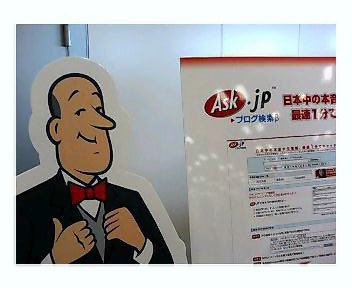Ask Jeeves Search & Web 2.0 – CNET Japan Search Conference
Daniel Read, VP Consumer Products, from Ask Jeeves addresses the crowd at the The CNET Japan Innovation Conference. The conference is centered around Web 2.0, Blogging, Tagging and those effects on the traditional search engine. Daniel’s presentation was based on what Web 2.0 is, what it means, and to dispell the mystery around it. Quick Ask Jeeves & IAC background : 7th largest global web property, 4th largest search property, 25% US reach.
Daniel started the demo with a rundown on current search trends : Rapid growth in global search volume, doubling in next 4 years. Almost #1 activity on the web, and should soon overtake email as top Internet activity. Search dominates top web properties. Search starts the Internet’s journey. Key user needs : relevant results, quick site, certain features, presentation of search results, search frustrations. Top frustrations : 23% lose track, 22% sorting through results, thinking of new ways to phrase search, not knowing which results are best.
 What is web 2.0? Web 2.0 is a work in progress which is a transtition of the architecture of the web and its applications. Such variables of the transition are blogs, wikis, AJAX, Google AdSense. 2.0 is taking search beyond the initial ten blue links such as more data, meta data and tagging, blogging is a revolution in micropublishing, advertising driven services, search verticals emerging and expanding quickly (local maps for example). Mashups are an important part of Web 2.0, expanding or improving upon existing products.
What is web 2.0? Web 2.0 is a work in progress which is a transtition of the architecture of the web and its applications. Such variables of the transition are blogs, wikis, AJAX, Google AdSense. 2.0 is taking search beyond the initial ten blue links such as more data, meta data and tagging, blogging is a revolution in micropublishing, advertising driven services, search verticals emerging and expanding quickly (local maps for example). Mashups are an important part of Web 2.0, expanding or improving upon existing products.
Growth in Data Feeds, blog feeds increasing at 500% per year. Bloglines as the Universal Inbox, reading and experiencing blogs & data which are only what you’re interested in. Ask.jp recently launched a new blog search which is an important next step which Ask plans on integrating across all Ask properties. Note : As popular as blogs and mobile Internet are in Japan, search is still very basic, leaving a huge market for these Search 2.0 offerings from companies like Ask and Yahoo. And given the high level of adoption by the Japanese market of personal blogs and user reviews, the Search 2.0 offerings are sure to be successful. Google, which does not offer many Japan targeted search services beyond web and image search, may want to pay attention to Yahoo and Ask moves if Google wants to take a serious stake of the Japanese search market beyond its strong group of AdWords Japan partnerships (Big Globe, Ask, Goo, excite Japan, and Big Nifty).
Next Generation Ideas :
User interface innovation: Smart Answers change the area of focus on results pages shown via an eye tracking study. Pictures are shown to be more relevant that the web results in user behavior. Innovation in the presentation of search related content benefits the user experience..
Mashup & Vertical example : Trulia Real Estate search, emergence of verticals. Ask Jeeves is monitoring how mashup verticals progress themselves. Another example is Indeed. Daniel continued to stress the work that independent verticals are doing as a modelfor search engines and the future of search. Maybe some IAC acquisition plans coming up in the future? More notes : AJAX search and 2.0, inquisitorx.com, remixing the search homepage. Transactions are being brought forward to the user rather than the user going to the transaction.
Consumer Generated Media : Personal publishing via blogs, in the Japanese market blog publishing is more personal vs. the US commercial blog market. Quality is user policed by the owner or members of the blog group. Content and data is distributed via RSS feeds. Over 1,356,081 RSS feeds available via Bloglines.com. Only 14,000 feeds or so really matter, with over 50 subscribers, the short tail of RSS feeds. Only 60 feeds have over 5,000 subscribers, which are considered Top Sources by Ask (ex. Paris Hilton’s blog).
ASK innovation and new technology :
* Teoma, Ask’s core search technology. Teoma views the web as a social network, which deals with relevance differently than other search enignes, analyzing topics and communities online rather than site by site.
* Smart Answers : Users are satisfied by the program, providing a more experiencial search to Ask.
* Related topics to other topics: Zoom In, Zoom Out : Narrow Your Search, Expand Your Search, Related Names. Daniel gives a search for Ichiro Suzuki as an example, funny though as the Google AdSense ad in the search results is a Suzuki Car ad. One challenge which I think Ask faces is while they are integrating all of these third party offerings into the Ask Jeeves search results, there must be a synergy in this integration. Perhaps some more intense Google AdSense ad filtering may be needed.
* Binoculars : preview of site before visiting, helping users judge the target site beofre actually visiting the site.
* Web Answer : Actually answers the question in the search query as #1 position, the original core offering of Ask Jeeves.
* MyAsk or MyJeeves : First major search engine to roll out a personalized search service, lets the user build their own search index. Allows user collaoration, one core of web 2.0.
(This is a bit of a rough review of the Ask Japan session, but I will be speaking with them later today to fill in some holes and will be offering some new, more polished information over the weekend.)



